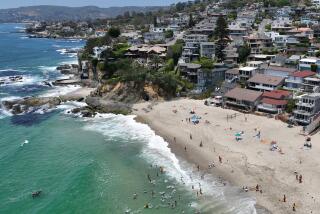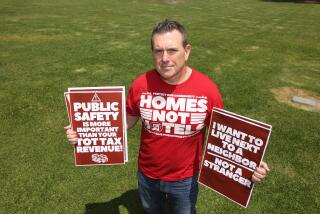Beach Curfews Get Credit for Calmer Nights : Public order: City officials report the incidence of disturbances, police calls and even graffiti have decreased since 10 p.m. shutdown began in spring.
- Share via
BOLSA CHICA STATE BEACH — Eddie Strong got a little melancholy when he talked about those summer campfires and late-night strolls from a time not too long ago.
He and his fiancee “used to come here in the evening, build a fire and then go walking hand-in-hand on the beach under the moonlight,” Strong, 22, of Anaheim said one day last week as he idly sifted sand through his fingers. “Now, we don’t even start a fire because we know the beach would close soon and when we take our walk, we’re always rushing to finish.”
While it’s regrettable that they may have inconvenienced late-night visitors like Strong, state and local officials who slapped a 10 p.m. curfew last spring on the county’s beaches say shutting down an hour or two earlier noticeably decreased the number of disturbances and police calls.
But police said they cannot be specific about the dip because they cannot separate crime records specifically for the beach. Instead, they categorize their response calls by crime, such as numbers of burglaries or robberies, not by specific geographic area.
“It’s normal police functions to go along and keep routine stats but you don’t pinpoint anything until you have (identified) a problem,” said Huntington Beach Police Officer Michael Corcoran. Because crime at the beach has not been a major problem this summer, police have not tracked those crimes specifically.
For the cities with 10 p.m. closings, having a curfew is more of a preventive action, a cost-cutting measure and a unity stand among areas whose beaches are closely lined together.
Huntington Beach Marine Safety Capt. Bill Richardson said: “As long as beaches adjacent to us continue their (10 p.m. curfews), it would be foolhardy for us to change the curfew back to the way it was.”
Richardson and other municipal officials worried that if their city beaches were open later than others, late-night party goers would flock there. So for the first time this summer, patrol officers in April began shooing people off some of Orange County’s most popular beaches at 10 p.m.
Because of budget problems and occasional incidents of gang activity and drunken brawls on the beach, the state Department of Parks and Recreation started the curfew trend in April when it decided to change the closing hours of Huntington and Bolsa Chica state beaches from midnight to 10 p.m. Next month, these two beaches will close at 8 p.m. through the winter season.
Fearing that those turned away at the state beaches may just move down the sand, Huntington Beach, Newport Beach and Seal Beach, which had curfews of 11 p.m. or midnight, followed suit. And unless the state or other beaches revert back to later closing hours, officials in these cities say the 10 p.m. curfew will remain.
“The curfew hasn’t hurt so we’re not looking to change,” said Newport Beach Detective Cmdr. Jim Jacobs, who as interim police chief this spring recommended that the city impose a curfew.
Officials in cities with 10 p.m. shutdown hours said beach visitors compensated for it by arriving earlier. As a result, there were less late-night problems such as fights, loitering or drunkenness, officials said.
It’s still early to tell, but some officials of those cities say the curfew may be responsible for a decrease in graffiti and tagging activities on beachfront property.
“I can’t explain the lull,” said Dave Niederhaus, Newport Beach director of general services, but “something has caused the graffiti to slow down.” He added that the curfew, along with a stronger police presence and cooler weather, are probably contributing factors.
Also, beach patrol officers and lifeguards reported seeing fewer gang members after dark. Conversely, more families are now coming to the beach to watch the sunset, police and officials said.
“When we had a later curfew, older people and their family weren’t going to the beach after it got dark and some gang members would show up and now they don’t,” said Ron Hagan, director of Huntington Beach community services. “Now, I think it’s safe to say the curfew has brought out more families to our beach.”
Despite their neighbors’ actions, Laguna Beach rejected a curfew, opting to remain the only city in the county with a beach open all night. The Laguna Beach City Council last month voted, instead, to increase police patrols.
The council members debated on whether to have a curfew following three violent attacks in the city this year: the beating of a middle-aged man on the beach in January; a gang-related shooting at Heisler Park on July 5 and an armed rape and robbery at crescent Bay Beach three weeks later.
The council members rejected the curfew after police maintained that the shooting and rape incidents could have happened anywhere. Police also noted that the January attack occurred long before curfews were imposed on other beaches.
“At this time, we’ve had a couple of random situations, three to be exact, that have caused some alarm,” said Deputy Chief Jim Spreine. “But we need to remember that crime is not limited to the beaches. I’m not against curfews, but do we want to surrender our beaches?”
A curfew in this world-renowned art community where storefronts line the beach raises economic concerns, officials concluded. Additionally, curfew enforcement would also be a problem because patrol officers would not be able to scale all the cliffs, caves and jagged rocks to look for violators.
“For right now, we think that having a curfew would create instead of solve more problems,” Spreine said. “We cannot show--at least at this time--that (other cities’ curfews) have had any impact on our beach. If we see or recognize an influx of activities or people doing criminal activities, then we’ll revisit this topic.”
Meanwhile, officials in the beach cities that imposed curfews said most of the residents seem to support the preventive action. Fears that a beach curfew would push crime elsewhere in the city has not materialized, police said.
“We have not taken troublemakers and pushed them inland,” said Huntington Beach Police Lt. Charles Poe. “We gave them a reason not to come to the beach after dark.”
As for the curfew causing a decline in business, some merchants said it hasn’t been noticeable. If there was a dip in summer business, they said, blame that on the economy.
“The beach is pretty quiet,” said Rick Maher, manager of Ruby’s diner, which stays open as late as 1 a.m. “Sometimes you’ll see a police (officer) escort somebody off the beach . . . but the curfew hasn’t affected us.”
Still, there are those who will always yearn for moonlit nights on the cool sand.
“I understand why there’s a curfew, I guess. We’ve seen a few fights between the kids here,” said Eddie Strong. But “there’s just something about going to the beach on the weekend and just gazing at the stars or do whatever you want” without feeling the pressure of finishing by 10.
More to Read
Sign up for Essential California
The most important California stories and recommendations in your inbox every morning.
You may occasionally receive promotional content from the Los Angeles Times.










